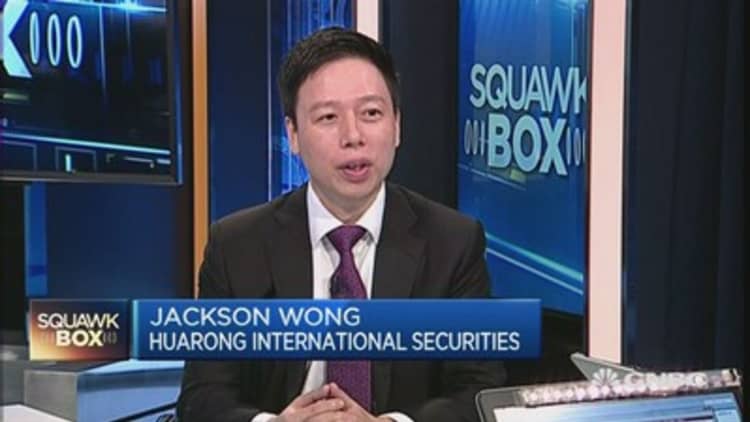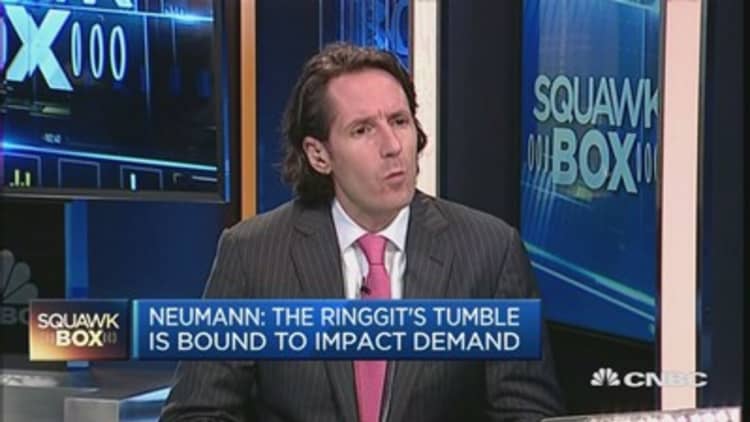
Asian equities slid deeper into the red on Wednesday, after a preliminary reading of China's mammoth manufacturing sector fell to a six-and-a-half-year low of 47.0 in September, rekindling worries over the world's second-largest economy.
The downbeat sentiment persisted even as Chinese President Xi Jinping defended his country's growth pace and reassured the world that China's financial markets will remain stable in his first policy address during a state visit to the United States.
"The flash China PMI fell more than market participants [had] expected and the PMI is also well below the 50-point threshold, which reaffirms that Chinese economic activity continues to slow and this adding to global economic and financial concerns," Elias Haddad, senior currency strategist at Commonwealth Bank of Australia, told CNBC Asia's "Street Signs."
An unimpressive handover from offshore markets also weighed on Asian bourses.
Major U.S. averages crashed more than 1 percent overnight, with materials shares among the hardest-hit due to a sell-off in commodities on the back of lingering worries about a slower-growing China.
News that Volkswagen would make a provision of $7.3 billion after allegations it cheated on vehicle emission tests sparked a global selloff in auto stocks. The Nasdaq Biotech Index also extended losses into a second day after U.S. Democratic presidential candidate Hillary Clinton said she would propose a monthly cap of $250 on prescription drugs.
Across the pond, the pan-European finished the day significantly lower, down 3.1 percent as autos tanked and weaker oil prices weighing on investor sentiment.
Meanwhile, markets in Japan remain shuttered for the Autumn Equinox holiday and are set to reopen Thursday.
China indices tumble
China's Shanghai Composite index lurched lower in the final 30 minutes of trading to close down 2.2 percent, with the selling concentrated among blue chips on Wednesday.
Brokerage houses surrendered Tuesday's advances; Citic Securities, Haitong Securities and China Merchants Securities lost more than 4 percent each.
Banking shares also lost ground, with Bank of China and Industrial and Commercial Bank of China (ICBC) declining more than 1 percent each, while PetroChina which has the heaviest weighting of any Chinese company in the Shanghai index, crashed down 2.1 percent.
Among other indexes, the benchmark CSI300 Index tanked 2.3 percent. Small-caps got off lightly on comparison; the Shenzhen Composite notched down 0.8 percent while the start-up board ChiNext erased losses to tick up 0.2 percent.
In Hong Kong, the index plunged 2 percent to touch its lowest level since September 8, with Citic Securities down 5 percent on news that the Chinese government has accused them of systematically front-running trades ahead of state-sponsored stock purchases to support the market.
"In the last week or so, Hong Kong markets rallied pretty well and showed resilience even with bad news in China and the U.S, but we hit a bump yesterday at the 22,000 level where we couldn't break the resistance," Jackson Wong, associate director of Huarong International Securities, told CNBC by phone.
"Weak data out of China sent a signal for everyone to sell off their position after the last two weeks and also before the 'window dressing' period next week. So there's no panic selling at all," Wong added.
Read MoreChina has a message markets don't understand
Taiex skids 2.1%
Taiwan's weighted index deepened losses to hit its lowest level in two weeks, on the back of heightened China-related jitters and as nervous investors eyed the country's central bank meeting.
Analysts are calling for the Central Bank of the Republic of China (CBC) to finally give in to a rate cut at its quarterly policy meeting on Thursday, after having kept its policy interest rate at 1.875 percent since 2011, amid stuttering external demand.
The CBC governor told parliament earlier in the day that monetary policy is "very loose" and indicated deflation was not a threat for the island, Reuters reported.

ASX falls 2.1%
Australia's S&P ASX 200 index accelerated its pace of declines to finish at a more than two-week trough, after fresh factory data out of China — Australia's largest trade partner — once again heightened concerns over the stability of the mainland economy.
It was a broad-based slump in Sydney on Wednesday. All four major lenders plummeted between 2.3 and 3.7 percent, while the renewed weakness in commodity prices put a chokehold on the heavyweight resources sector.
Market bellwether BHP Billiton sank 4.4 percent over the global miner's plans to raise money with hybrid securities.
"BHP announced that Australian shareholders will have to vote on a plan to pay the dividend for BHP's London listing out of the Australian entity's earnings. The issue is that while the ASX-listing's dividend is fully-franked and receives the corresponding tax benefits, the dividends to the U.K. listing will not receive tax benefits," IG market analyst Angus Nicholson wrote in a note.
"BHP also announced it is planning a hybrid capital raising as $13 billion of short-term debt is set to expire within the next five years. All of these factors seemed to weigh on the stock today, alongside a general negativity around the materials sector," he added.
Meanwhile, the Australian dollar dropped 0.7 percent to $0.7038 versus the greenback, its lowest level since September 10.
"The Australian dollar should remain on the downside against the U.S. dollar because Chinese data will continue to struggle as the PMI data today suggested, CBA's senior currency strategist Elias Haddad said.
"Downside pressure in iron ore prices because of the market's excess supply, the risk that the Reserve Bank of Australia (RBA) could cut rates again and the fact that the dollar will stay strong [will] continue to weigh on the Aussie dollar going forward," he added.
Kospi slumps 1.9%
South Korea's Kospi index finished at a one-week low.
The index's top weighted stock Samsung Electronics eased 1.2 percent, while Hyundai Motor widened losses to 4.3 percent on the back of a downturn in global auto names.
Shares of Kia Motors and automotive parts supplier Hyundai Mobis declined 3.4 and 2.5 percent respectively, but logistics company Hyundai Glovis erased early losses to notch up 1 percent.
Also bucking the downtrend was stationery maker Monami which surged nearly 30 percent.

Rest of Asia down
Markets in Southeast Asia largely fell more than 1 percent each, with the exception of Singapore, Thailand and Vietnam whose benchmark indexes edged down between 0.4 and 0.9 percent.
China-sensitive currencies also tumbled in Asian trade, with the Indonesian rupiah losing 1 percent of its value against the U.S. dollar to hit a fresh-17 year low.
The Malaysian was 1.2 percent weaker, last seen at 4.3450 against the greenback.

